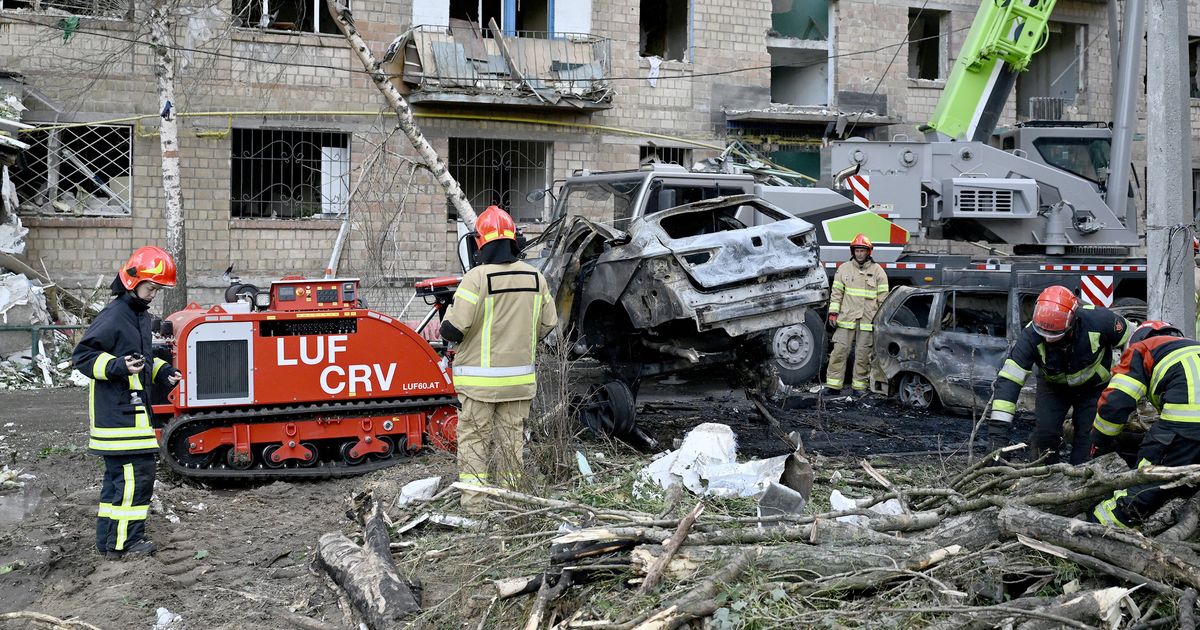By David L. Stern and Robyn Dixon
Washington Post
KYIV, Ukraine – Ukrainian officials said Friday that the death toll in Kyiv from a Russian aerial bombardment the day before had nearly doubled overnight to at least 31, as more bodies were pulled from under rubble, making it the deadliest strike on the capital so far this year.
As the grim recovery operations continued, Germany announced it would provide two Patriot air defense systems to Ukraine in the coming days and that Berlin would be at the top of a list to receive new-model replacements from the United States.
Ukraine has pleaded with its Western supporters for more air defenses amid unrelenting Russian missile and drone attacks.
Among the dead were five children, the youngest 2 years old, and 159 were injured, Ukrainian President Volodymyr Zelenskyy said in a post on Telegram. He said that in July alone, Russian forces launched about 3,800 drones, 260 missiles – including 128 ballistic missiles – and 5,100 guided bombs.
In June, an overnight attack killed 28 people.
Zelenskyy called the overnight attack on Thursday “a vile blow” and said it demonstrated that additional pressure on Moscow was needed and that Ukraine’s Western allies should tighten their sanctions against the Kremlin. President Donald Trump has been threatening to do just that.
“No matter how much the Kremlin denies their effectiveness, (the sanctions) are working and must be stronger – to hit everything that allows such strikes to continue,” Zelenskyy wrote, after receiving a report on the strike from Interior Minister Ihor Klymenko.
Trump appears ready to slap additional sanctions on Moscow in a bid to pressure Russia to accept a ceasefire. On Thursday, Trump called the airstrikes on Ukraine “disgusting” and “a disgrace,” though he questioned whether sanctions would influence Russian President Vladimir Putin.
“I don’t know that sanctions bother him,” he said. “I don’t know if that has any effect, but we’re going to do it.”
The Patriot transfer to Ukraine was made possible by an agreement with the United States that Germany would be “the first nation to receive newly produced, latest-generation Patriot systems at an accelerated pace,” which Berlin would pay for, German Defense Minister Boris Pistorius said in a statement.
The delivery to Ukraine would also include “additional system components within the next two to three months,” Pistorius said.
Ukrainian officials have not commented on the German transfer. Patriot antiaircraft systems, however, are highly valued for their ability to shoot down cruise and ballistic missiles, which Russian forces have been firing at Ukrainian targets in clusters, combined with waves of drones, to overwhelm Ukrainian air defenses.
Ukraine’s air force said that Thursday’s overnight attack involved more than 300 drones across Ukraine, 21 of which struck targets, and Kyiv bore the brunt.
The Ukrainian military also said that eight cruise missiles were fired, five of which penetrated its air defenses. Media reports indicated that all the missiles were directed at Kyiv. One missile partially destroyed an apartment block in a western district of the capital, burying more than a dozen people under rubble.
Trump also has been threatening secondary sanctions that would penalize buyers of Russian oil, mainly China and India, potentially starving Russia of funds for its war machine, but so far he has refrained from imposing them, arguing this could alienate Moscow and reduce hopes of reaching a peace deal.
Russia, meanwhile, has launched deadly attacks on Kyiv and other Ukrainian cities, while grinding forward and seizing more territory in eastern Ukraine. Russia has struck playgrounds, maternity hospitals, apartment buildings, civilian buses and other civilian targets. Russia’s Ministry of Defense insists that Russia attacks military targets with “precision strikes.”
Earlier in the week, Trump tightened the deadline from 50 days to 10 for Russia to agree a ceasefire with Ukraine or face new sanctions. Trump said his special envoy, Steve Witkoff, would fly to Russia to meet with officials after visiting Gaza and Israel.
Witkoff has met Putin four times in solo meetings in a bid to broker a peace deal, eschewing State Department experts on Russia, and using an interpreter supplied by the Kremlin on at least one occasion. He initially appeared to credit Putin with a will to end the war in return for keeping the territory Russia has seized and shutting Ukraine out of NATO. Those hopes proved overly optimistic.
On Thursday, Secretary of State Marco Rubio said in a radio interview that senior U.S. officials were in contact with their Russian counterparts this week but made “no progress” on securing a ceasefire.
Trump has suggested that he is losing patience with Putin after phone conversations in which Putin appeared conciliatory, only to launch new airstrikes, while Ukraine has accepted Trump’s call for a ceasefire, Rubio suggested.
“And I think what bothers the president the most is he has these great phone calls where everyone … claims, ‘Yeah, we’d like to see this end, if we could find a way forward,’ and then he turns on the news and another city has been bombed, including those far from the front lines,” Rubio said.
“So, at some point, (Trump has) got to make a decision here about how much to continue to engage in an effort to do ceasefires if one of the two sides is not interested in one,” Rubio said.
On Friday, Putin said that any disappointments in the progress of peace talks arose from “excessive expectations.”
“Negotiations are always in demand and always important, especially if it is a desire for peace. I evaluate them positively overall,” Putin told journalists after meeting Belarusian President Alexander Lukashenko at Valaam island in Karelia, in northwest Russia.
Putin said Russia’s conditions had not changed. Those conditions have long been tantamount to Ukraine’s surrender. Putin said Russia needed “a lasting and durable peace on good basic foundations that would satisfy both Russia and Ukraine and would guarantee security of both countries.”
– – –
Dixon reported from Riga, Latvia. Kostiantyn Khudov contributed to this report.
